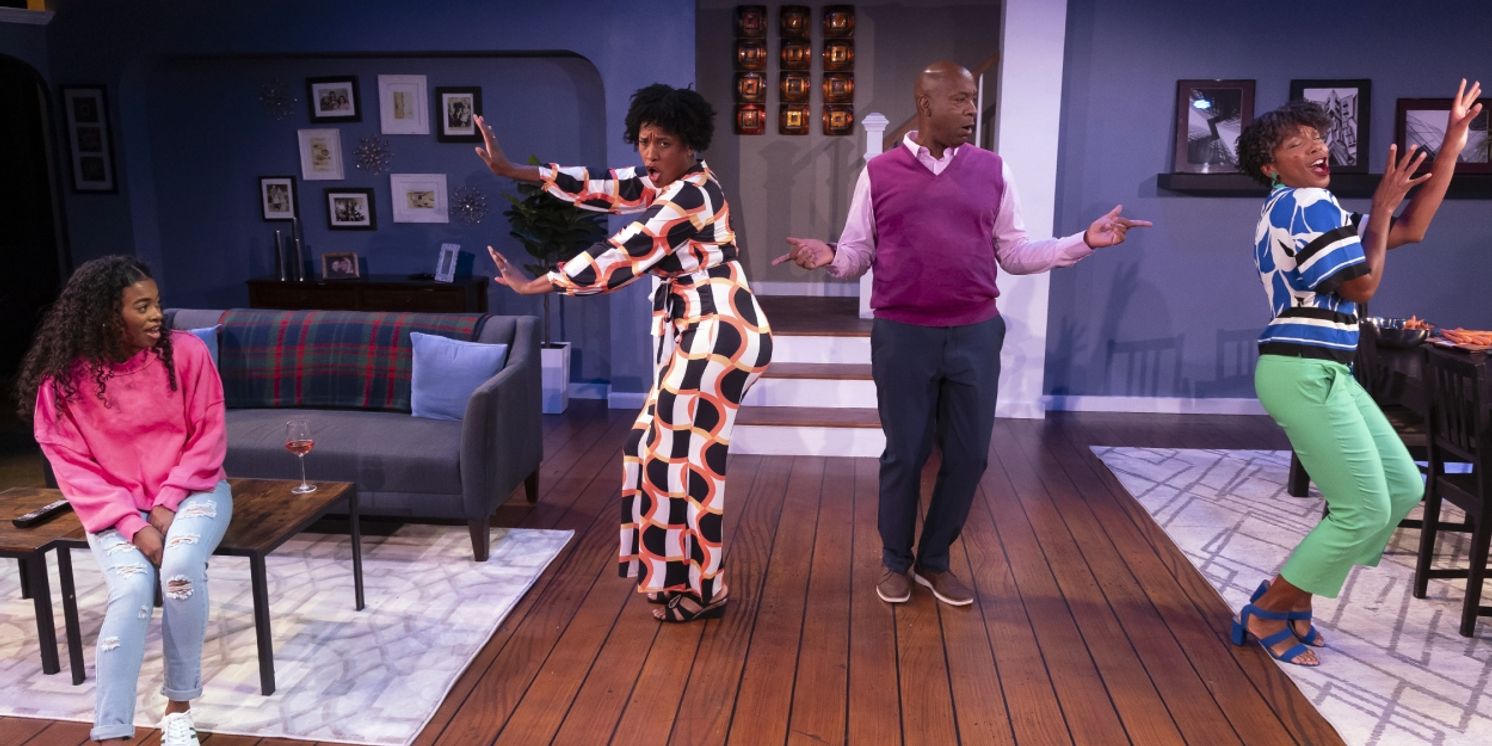Review: FAIRVIEW Opens the 20th Anniversary Season at Capital Stage
The production runs through September 29th

Capital Stage is embarking on an exciting 20th anniversary season. Kicking it off is Jackie Sibblies Drury’s Pulitzer Prize-winning play, Fairview. It’s a timely discussion about race, society, and expectations that leaves one asking questions long after the last bow.
The story opens onto a beautiful set designed by Eric Broadwater (who I need to come design my home). In the comfortably chic living area, Beverly (Kathryn Smith-McGlynn) frantically goes about preparations for her mother’s birthday dinner while anxiously anticipating the chaos that will come when her sister, Jasmine (Brooklynn T. Solomon) arrives. Her husband, Dayton (Adrian Roberts), tries to help but charmingly bumbles his responsibilities. When Jasmine does arrive, with rosé and condescension in tow, she manages to subvert Beverly’s authority over her daughter Keisha’s (Kali Honeywood) future. It’s all so entertaining, relatable, and normal. Which, I’m guessing, is exactly what Sibblies Drury wants us to see, because the average Broadway theatre-goer, according to The Broadway League, is white, middle-aged, educated, and financially secure. This family is African American, and they are doing what all middle-class white families do: worrying about family, college, relationships, and whether the cake is burning. They are just like you, average audience member, and this is partially a letter to the white audience. Keisha wants to know, “Do I have to keep talking to the white people?” Unfortunately, Keisha, you do.
The first act would be entertaining enough, but Sibblies Drury has created the most unique staging in the second. While the Black actors repeat Act One silently, four white actors gaze casually upon the scene unfolding in front of them and chat about what race they would be if they could choose to be another. The white actors are also stereotypes: the brash white male, Jimbo (Scott Coopwood); the foreigner dismissive of Americans, Bets (Alissa Doyle); the young and cheeky Mack (Brandon Lancaster); and the one who tries to disguise her guilt, Suze (Shannon Mahoney). While Suze insists that race is a construct, Jimbo launches into a long rant about how we destroy ourselves. “I love to root against myself because everyone else is, too.” We can understand where Keisha is coming from when the noise coming from others is amplified in our own heads.
It’s up to the audience to keep up with the verbal volleys and constantly changing landscape as we enter Act Three, which the white actors curiously infiltrate. The organic experiences of this Black family are shuttered as each Black character is imbued with another stereotype: the teenage mother, the drug addict, the gambler. The confusion continues, with only Keisha noticing anything is amiss, until she says enough. She asks the audience, “Do I have to tell them I want them to make space for us?” Unfortunately, Keisha, you do.
Director Anthony D’Juan has again crafted an artful story with difficult material. He has brought together eight very different characters and elicited genuine affection married with real-life frustration. Frustration that is righteous. The pleas for help are delivered with heart-wrenching desperation by Honeywood, whose Keisha comes across as preternaturally astute amongst adults who have already all been desensitized. Also noteworthy is Mahoney, who is now one of my favorite local actors. Her confusion as a well-meaning ally hit the mark with authenticity and laugh-out-loud expressions. It would be impossible to pull off a show like this without the impressive talent of the entire cast. Smith-McGlynn and Roberts come together again with comfortable chemistry, Solomon is always a natural force of energy, and Coopwood’s oratorical chops shine in his quite long and powerful speech. Doyle and Lancaster are also great, both as white spectators and family infiltrators.
While Sibblies Drury hoped that this show wouldn’t be relevant for very long, it can always serve as a reminder of what is important. Giving people space to be themselves, recognizing that we are all human, and examining issues of race and relationships is always going to be relevant. The fact that it’s done in such a creative and funny way is icing on the burnt birthday cake.
Fairview plays at Capital Stage through September 29th. More information and tickets may be found online at Capstage.org, by telephone at (916) 995-5464, or in person at the Box Office at 2215 J Street in Sacramento.
Photo credit: Charr Crail
Reader Reviews
Videos

